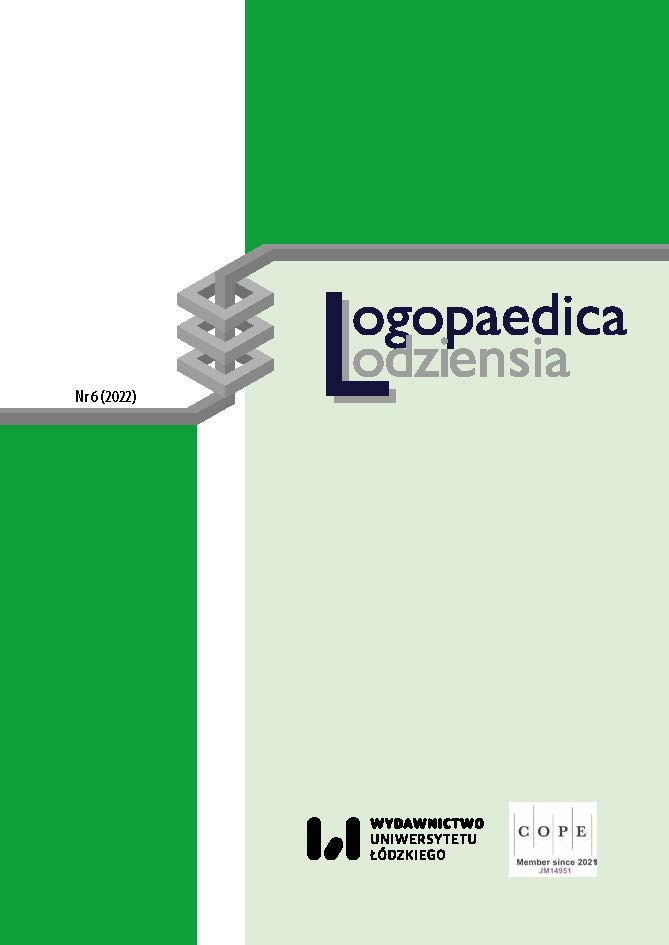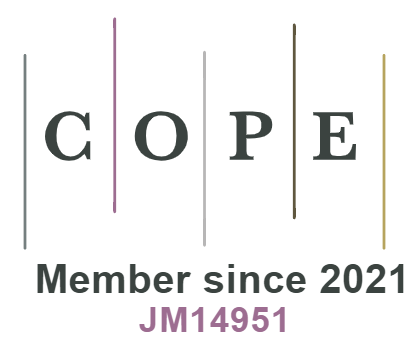Autism Spectrum and Developmental Aphasia. Comparison of Language Development
DOI:
https://doi.org/10.18778/2544-7238.06.17Keywords:
autism spectrum disorder, developmental aphasia, language proficiency, intelligenceAbstract
The study involved 37 children with an autism spectrum disorder and 12 children with developmental aphasia, aged 2,6 to 8,1. They were assessed using the Sentence Comprehension Test, the Speech Therapy Screening Test and the Stanford‑Binet Intelligence Scale. It turned out that the autistic children and aphasic children have a borderline intellectual disability and are delayed in speech development. There were no statistically significant differences between them in terms of language understanding. Children with an autism spectrum disorder obtained significantly higher results than children with childhood aphasia in the tests assessing the dictionary, grammar and pronunciation. A high correlation was also found between the results in the Sentence Comprehension Test and the Speech Therapy Screening Test. However, the correlation between language understanding and non‑verbal intelligence turned out to be statistically insignificant.
Downloads
References
Bartak L., Rutter M., Cox A., 1977, A comparative study of infantile autism and specific developmental receptive language. III Discriminant function analysis, „Journal of Autism and Childhood Schizophrenia”, No. 7, s. 383–396.
Google Scholar
DOI: https://doi.org/10.1007/BF01540396
Bishop D.V., 1989, Autism, Asperger’s syndrome and semantic-pragmatic disorder: where are the boundaries?, „British Journal of Disorders of Communication”, No. 24(2), s. 107–121.
Google Scholar
DOI: https://doi.org/10.3109/13682828909011951
Błeszyński J., 1997, Echolalia i zaimek „ja” w kształtowaniu się mowy dziecka z autyzmem, [w:] T. Gałkowski (red.), Dziecko autystyczne, t. 5, Warszawa: Wydawnictwo KTA, s. 97–105.
Google Scholar
Brzeziński J., 2001, Metodologia badań psychologicznych, Warszawa: Wydawnictwo Naukowe PWN.
Google Scholar
Czaplewska E., 2012, Rozumienie pragmatycznych aspektów wypowiedzi przez dzieci ze specyficznym zaburzeniem językowym SLI, Gdańsk: Gdańskie Wydawnictwo Psychologiczne.
Google Scholar
Giers M., 2011, Zespół Williamsa, Gdańsk: Wydawnictwo Harmonia Universalis.
Google Scholar
Kielar‑Turska M., 2012, Rozwój sprawności językowej i komunikacyjnej, [w:] E. Czaplewska, S. Milewski (red.), Diagnostyka logopedyczna, Sopot: Gdańskie Wydawnictwo Psychologiczne, s. 15–63.
Google Scholar
Klasyfikacja zaburzeń psychicznych i zaburzeń zachowania w ICD–10. Badawcze kryteria diagnostyczne, 1998, Kraków–Warszawa: Uniwersyteckie Wydawnictwo Medyczne „Vesalius”.
Google Scholar
Kordyl Z., 1968, Psychologiczne problemy afazji dziecięcej, Warszawa: Państwowe Wydawnictwo Naukowe.
Google Scholar
Kryteria diagnostyczne zaburzeń psychicznych z DSM–5, 2018, Wrocław: Wydawnictwo Edra Urban & Partner.
Google Scholar
Lee L.L., 1971, Northwestern Syntax Screening Test, Evanston: Northwestern University Press.
Google Scholar
Lincoln A.J., Yeung‑Courchesne R., Elmasian R., Grillon Ch., 1989, Pathophysiologic Findings in Nonretarded Autism and Receptive Developmental Language Disorders, „Journal of Autism and Developmental Disorders”, Vol. 19, No. 1, s. 1–17.
Google Scholar
DOI: https://doi.org/10.1007/BF02212714
Morton‑Evans A., Hensley R., 1978, Paired associate learning in early infantile autism and receptive developmental aphasia, „Journal of Autism and Childhood Schizophrenia”, No. 8, s. 61–69.
Google Scholar
DOI: https://doi.org/10.1007/BF01550278
Panasiuk J., 2015, Postępowanie logopedyczne w przypadkach alalii i niedokształcenia mowy o typie afazji, [w:] S. Grabias, J. Panasiuk., T. Woźniak (red.), Logopedia. Standardy postępowania logopedycznego. Podręcznik akademicki, Lublin: Wydawnictwo Uniwersytetu Marii Curie‑Skłodowskiej, s. 309–346.
Google Scholar
Pruszewicz A., 1992, Opóźniony rozwój mowy, [w:] tenże (red.), Foniatria kliniczna, Warszawa: Państwowy Zakład Wydawnictw Lekarskich, s. 233–241.
Google Scholar
Roid G.H., 2003, The Stanford‑Binet Intelligence Scales, Itasca: Riverside Publishing.
Google Scholar
Sajewicz‑Radke U., Radke B.M., Lipowska M., 2017, Skala inteligencji, Gdańsk: Pracownia Testów Psychologicznych i Pedagogicznych w Gdańsku.
Google Scholar
Sahlmann L., 1969, Autism or Aphasia?, „Developmental Medicine & Childhood Neurology”, Vol. 11(4), s. 443–448.
Google Scholar
DOI: https://doi.org/10.1111/j.1469-8749.1969.tb01462.x
Smereka T., 2015, Rozumienie przekazów językowych i jego zaburzenia, Wrocław: Wydawnictwo Mkwadrat Maciej Młynarski.
Google Scholar
Tarkowski Z., 2002, Przesiewowy test logopedyczny, Lublin: Wydawnictwo Fundacji „Orator”.
Google Scholar
Tarkowski Z., 2017, Prosty opóźniony rozwój mowy, [w:] tenże (red.), Patologia mowy, Gdańsk: Wydawnictwo Harmonia Universalis, s. 213–234.
Google Scholar
Zaleski T., 1992, Opóźniony rozwój mowy, Warszawa: Państwowy Zakład Wydawnictw Lekarskich.
Google Scholar
Downloads
Published
How to Cite
Issue
Section
License

This work is licensed under a Creative Commons Attribution-NonCommercial-NoDerivatives 4.0 International License.












